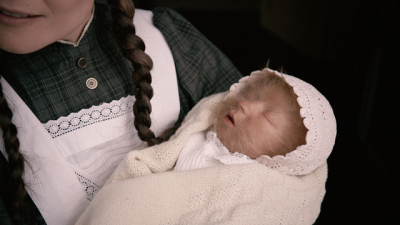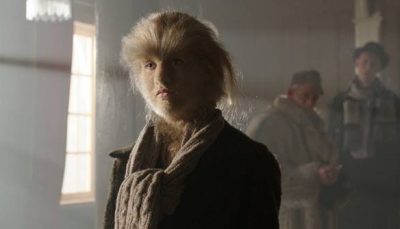A new Norwegian film debuted over the weekend at the Haugesund Film Festival, with pre-release hype that is already sending it to cinemas in at least 40 countries. Reviews were mixed for “Løvekvinnen” (The Lion Woman), which tells the story of a woman born with hair covering her entire body, but the film was generally praised for its respectful tone and technical triumphs.

The film, set in the years between 1912 and 1937, is based on a best-selling novel by Norwegian author Erik Fosnes Hansen. His heroine is Eva Arctander, born to a train station master in a small town in Norway and his wife, who dies in childbirth. Not only is he consumed with grief over the death of his wife, their baby daughter suffers from hypertrikose, which leaves her not only with more susceptibility to respiratory ailments and fatigue but also with hair from top to toe.
The novel and the film, which can spur memories of films like Elephant Man and Mask, expresses feelings of loneliness and being different from the rest but also shows how Eva faces her challenges and manages to overcome them. Newspaper Aftenposten reported on Monday that Hansen wrote an entirely new conclusion to his story for the film, so that it would have a happier ending.
“The book ends in a slightly dark manner and I understood quite quickly that we needed a different ending when a film was made out of it,” Hansen said. “The story is about the love between a father and a daughter, and we had to find an ending that better bore that message.”
Lauded for make-up and technical effects
For the Norwegian film industry, the film already stands out for its relatively large budget (at NOK 80 million, only the recent Kon-Tiki had more money to spend on production) and special effects. “The production design is detailed but not overdone, and contrasts a small community at the beginning of the 1900s with, for example, Copenhagen,” wrote film critic Øyvor Dalan Vik in newspaper Dagens Næringsliv (DN) on Monday. The portrayal of the main character, played by three different actresses at three different stages of her life, is also “fascinating,” writes Vik, set at a time when people with abnormalities were often put on display in so-called “freak” shows.
Eva’s stern father opts instead to protect her after initially rejecting her in a mixture of sorrow and shock. He ends up taking care of her in a manner he deems best, which isolates her inside the station building that becomes a type of prison. Eva proves to be exceptionally intelligent, however, and a mathematical genius of sorts. Such talent can’t be suppressed for long.

The film also dwells on how others react to Eva as she moves from the small train station community to the big outside world. Her own father initially calls her a “monster” and then tries to hide her away to shield her from worse reactions and gossip in the small community. Eva’s nanny comes to love her and the telegraph agent at the station appreciates Eva for the intelligence and mathematical ability she possesses. Academic colleagues in Copenhagen later seem to want to nurture her talent, but also have their own agendas and view her deep down as a medical abnormality.
Director Vibeke Idsøe is a good friend of author Hansen and assembled a strong cast of Scandinavian actors including Rolf Lassgård, who plays Eva’s father Gustav Arctander. Like the book, her film moves chronologically from Eva’s childhood and awakening, structured around her personal liberation and physical revolt.
Reviews of the film were mixed, with many critics praising its sobriety and technical mastery but complaining that it didn’t quite get under Eva’s skin. Some felt it was almost too respectful and doesn’t dig deep enough into the issues. Others called it “emotionally gripping” and Lassgård thinks it’s a film that can do well in large parts of the world.
Producer John M Jacobsen expects more countries will buy the film and he especially hopes it will get into US cinemas. Interest has been especially high in Germany.
“This isn’t just a story about something that happened 100 years ago,” Lassgård told Aftenposten. “It’s a story about relations between people and universal destiny that applies no matter where you go in the world. Parents all over the world can have children who are different, what do they think and how do they deal with it?”
The film will premiere in Norwegian cinemas on Friday.
newsinenglish.no/Nina Berglund

